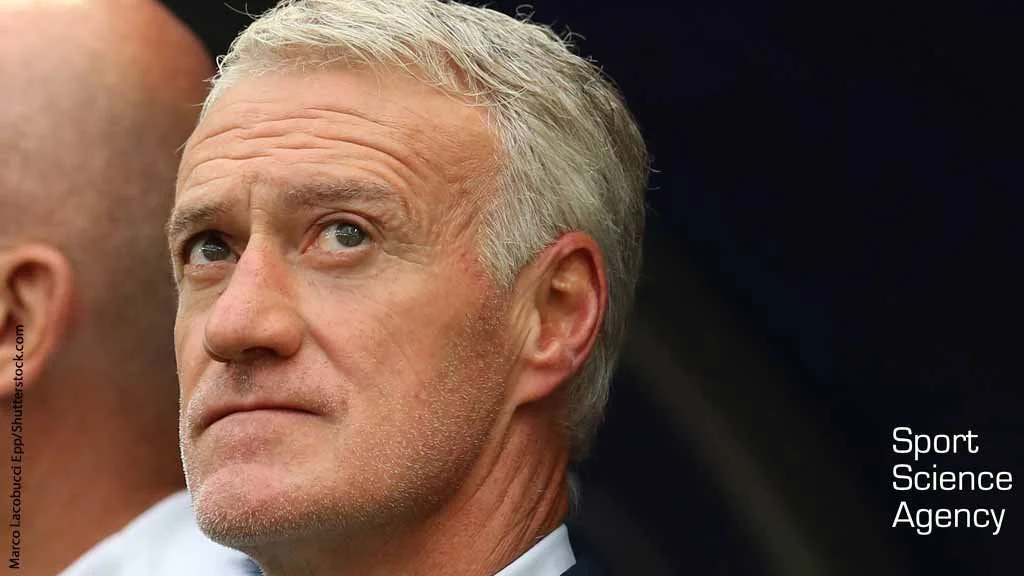Preparations for France’s World Cup final appearance vs Argentina have been seemingly hit by an outbreak of illness amongst the squad. Prior to their semi-final, reports started to emerge that players were unwell. Dayot Upamecano and Adrien Rabiot missed the 2-0 victory over Morocco with the France Football Federation (FFF) confirming the reason both players were absent was due to illness.
Didier Deschamps, manager of France, might be without key players for the World Cup final because of illness
Unsurprisingly, the FFF has been reluctant to comment on player health in great detail. This has fuelled rumour and speculation within the French media about the extent and cause of the mystery bug affecting some players. However, we now know that perhaps its first-choice central defensive partnership of Raphael Varane and Ibrahima Konate as well as winger Kingsley Coman have missed training due to illness and have been separated from the main group as they prepare for the final.
Injury often gains the headlines in terms of athlete preparation and its impact on player selection. However, avoiding illness, particularly when teams and squads are in such close proximity remains a priority for performance and medical staff.
But how susceptible are athletes to illness?
For a number of years, researchers believed that intense exercise temporarily decreased immunity and provided an “open window” for infections. Examining the scientific markers associated with immune function following exercise also seemed to support the logic of this belief. However, Prof. Neil Walsh in his 2018 paper, Recommendations to Maintain Immune Health in Athletes, highlighted a number of studies demonstrating that elite athletes actually suffered fewer upper respiratory tract infections than their sub-elite counterparts.
Could the reason for these immunological differences be due to superior genetics? Are the ultra-elite just more resistant to illness due to innate physiological function? Although some evidence exists to support this idea, according to Walsh & Oliver (2016), a much simpler explanation resides in the lifestyle and performance behaviour of international athletes. They highlighted key factors such as better hygiene, infection avoidance, diet, sleep and stress management as areas where elite athletes have developed improved habits and systems to maintain their health compared to others. Or putting it another way, elite athletes are just much better at looking after themselves than the rest of us.
The French football team will have significant processes in place aimed at reducing the risk of infection and transmission within the squad. This is done, primarily to keep players and staff healthy, which is the first duty of team doctors. But from a performance viewpoint, unsurprisingly, research supports the idea of remaining injury and illness free as a defining factor in sporting success. In essence, if a team can get its best players to play more often than the opposition, it enhances its relative chances of winning.
So winning isn’t just about training but combining a series of performance behaviours that manifest themselves in the ability to train and perform. At the elite end of sport, such as the World Champion French football team, the behaviour guidelines to try and contain any illness outbreak and support recovery are likely to be very similar to the recommendations below:
1. Try to avoid sick people (social distancing)
2. Ensure good hand hygiene (wash your hands)
3. Avoid self-infection (don’t touch your face)
4. Do not train with below the neck symptoms (feelings of fever or fatigue)
5. Monitor and manage all forms of stress (physical and mental)
6. Carefully manage increments in training
7. Replace overly long training sessions with more frequent spike sessions
8. Plan recovery
9. Aim for at least 7 hours of sleep each night
10. Eat a well-balanced diet
When looked at as a list, the guidance seems so simple. But for it to be effective, it has to become habitual. The fact that outbreaks of illness within squads are rare shows that usually, players are adhering to guidelines and are able to take to the field.
The message surrounding player hygiene obviously came to the fore during the pandemic. A host of hygiene partners entered the sponsorship market across sport, England’s own football team is sponsored by Dettol. Their role as part of the performance mix still hasn’t been well communicated. Research has shown, particularly during congested fixture periods, that the risk of infection and illness increases significantly as players’ immune systems are tested by intense exercise with limited time to recover (Morgans et al 2014).
In football, this has been particularly true during this fixture-congested season. At the World Cup, games have also come thick and fast. As finalists, France will play seven games in 27 days, meaning on average they have had a little over 3 days to recover between match days.
During a tournament, players exist in very close proximity to each other for weeks on end. They share a dressing room, train together on the pitch and in the gym, eat together, stay in the same hotel, travel together and obviously play games together. This means that if a player or member of staff does become ill the risk of infecting others can be high.
Hygiene partners have the chance to tell both the hygiene and the elite performance behaviours story. They can credibly put their products and messaging at the heart of the content. As the research has shown, remaining injury and illness free is a defining factor in sporting success. What is the power of sports sponsorship if it isn’t to create a credible link to success?
The FFF went into the World Cup with a host of high profile players unavailable because of injury. Their strength in depth has still allowed them to progress to the final. If illness removes even more players from the match day squad, the chances of retaining their title will undoubtingly be affected. But from a marketing and comms perspective, rather than remain tight lipped and allow rumour and speculation about a mystery illness to fuel press stories, the comms team could have considered how to tell the tale of elite performance behaviours.
Showcasing the plan and protocols that are in place to manage an illness outbreak involves the entire playing and non playing staff. By telling this performance story, the heat can be drawn out of any speculation whilst magnifying the sport science and medical professionalism being undertaken to manage the situation. For an organisation that entered the tournament as defending champions and has now reached another final, switching the focus to that of an elite performance process when facing a major challenge should be an easy comms strategy to deliver.
It is every player's dream to play in a World Cup final. Building up to that, the risk of injury and illness are constant issues that players and performance staff have to manage. But it is a fine line. Players can not train on their own all the time, team cohesion, tactical sessions and the avoidance of boredom mean they need to spend time together. Training also needs to be at an intensity to deliver fitness maintenance or adaptations so they can perform at the level required. For the sake of the players currently suffering, let's hope they can recover and get to play a part in a World Cup final, giving them an extra chapter in their own performance story.
Sport Science Agency uses its insight and expertise to tell performance stories and unlocks their value for brands, broadcasters and rights holders. To see some of our work click here If you want to know more about what we can do for you, drop us a note via info@sportscienceagency.com and we can arrange to go for a healthy vitamin-packed drink.


